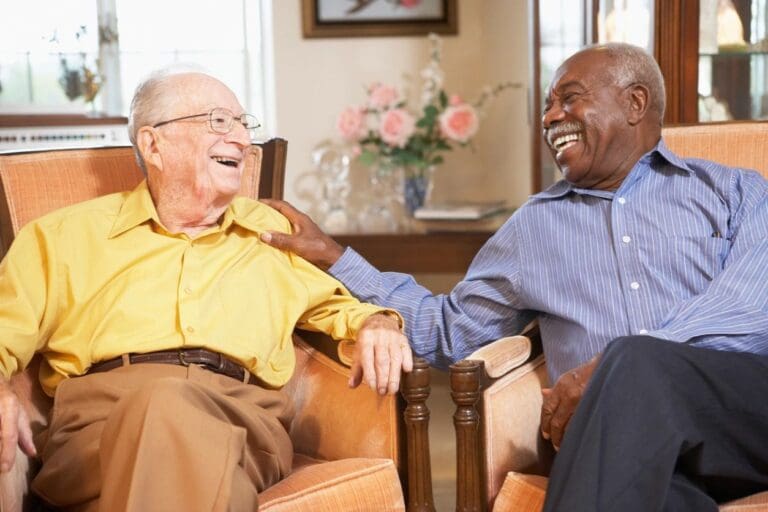Humor

Humor Cure
Noah – Lisa’s Dad
Patience, playfulness, and a healthy dose of humor are key weapons in overcoming the stubborn “I am not going to change” mindset. These qualities can diffuse tension and foster a more open, cooperative atmosphere for discussing change.
In the intricate dance of family dynamics, humor often became the saving grace, a gentle balm that smoothed over the rough edges of stubbornness and resistance. Lisa’s dad really enjoyed her husband’s wicked sense of humor. Lisa would often enlist her husband’s help when she and her dad got in a heated argument, mostly about her mom and their marriage. Even when her husband was out of town, Lisa would wait for him to come home to have a critical conversation with her dad.
Were it not for her husband’s sense of humor, her parents’ house would have remained unsold. Her dad would say, “I am not going to feel like a man if I sell my castle.” Her husband would sit down with her dad and play a game of chess, and start telling jokes like…
“Why did the man say his home was like a chess game?” Lisa’s husband
“Because chess game has rules and so does my castle” Lisa’s dad.
“Funny, how about this as an answer…. Because every time he thought he was about to make a move, his queen would change the rules!” Lisa’s husband responded with rolling laughter.
Another day after Lisa and her husband were arguing about his desire to buy yet another antique car that he could never possibly drive. She heard her husband tell a joke that she thought was more for her benefit.
“Why did the king have to let go of his castle in the chess game?” Lisa’s husband
“Because it was either the game or the castle” Lisa’s dad.
With roaring laughter Lisa’s husband said, “Because when he tried to bring it home, his wife reminded him they already had enough clutter without adding a rook to their living room.”
Lisa’s husband made her dad feel really good about himself with this joke “Why did the man say letting go of his castle was like renovating his home?”
Lisa’s dad responded with pride with his pet phrase “Don’t change what works!”
Lisa’s husband said with a smile “How about… Because as soon as he made one move, he realized everything else needed to be rearranged.”
Finally, one day, this joke led to a serious discussion.
Lisa’s husband “Why did the chess piece refuse to sell his house?”
Lisa’s dad said with some seriousness in his voice “Because that is his castle and accomplishment of his lifetime.”
Lisa’s husband responded light-heartedly “Because he heard the market was a real nightmare and didn’t want to make a move without checking it first.”
This joke led to a long discussion about how this was the right time financially to sell the house and make the most amount of money. Lisa joined the discussion, but stayed mostly silent, as the two men debated over various financial considerations from property value, taxes, and investment opportunities.
Her dad finally relented, “I guess it is time to let go of my castle and invest in my grandkids’ castles.” The decision to open education savings accounts for his grandchildren became his new mission, a purpose that gave him a sense of legacy and continuity.
The rest of the money was equally divided to take care of mom and dad.
In this journey, Lisa’s husband’s humor was the catalyst, turning the tide in battles once thought unwinnable. His playful approach, coupled with Lisa’s patience and strategic timing, proved that even the most steadfast resolve could be softened with laughter, turning contentious debates into cherished family memories.

Laughter in the Garden
Layla and Omar’s Story
Layla always knew that humor was a powerful t**l in managing her father’s stubbornness. Her father, Omar, was set in his ways and had a hard time accepting changes, especially in the garden he had tended for decades. Layla often found herself in heated discussions with him about updating the garden to make it safer and more manageable as he aged.
One sunny afternoon, Layla found Omar staring at the large, old oak tree that had been a fixture in their garden for as long as she could remember. “Dad, that tree is a hazard. It’s old and weak. We really need to take it down before it falls and hurts someone.”
Omar shook his head stubbornly. “That tree’s been here longer than you, Layla. It’s part of the family.”
Layla sighed, knowing this was going to be a tough battle. “I understand, Dad, but we have to think about safety.”
As the argument escalated, her husband, Larry, who had a knack for diffusing tension with humor, walked in from the garage. He could see the frustration on Layla’s face and the determination on Omar’s. “Hey Omar, why don’t trees like to play cards?” Larry asked, grinning.
Omar looked puzzled but curious. “I don’t know, why?”
“Because they’re afraid of the bark!” Larry laughed, and to his relief, so did Omar.
Layla smiled at Larry’s attempt to lighten the mood. “You know, Dad, if we remove that tree, we’ll have more space for a vegetable garden. Think of all the fresh tomatoes and cucumbers we could grow!”
Omar sighed, “I guess that does sound nice. But that tree has been here since you were a kid, Layla.”
Layla nodded, “I know, Dad. But it’s not safe anymore. We could plant a new one together, something that will grow quickly and still give us shade.”
Omar thought for a moment and then smiled. “Alright, let’s do it. But only if I get to choose the new tree.”
Layla hugged her father. “Deal.”
A few weeks later, as they planted a new sapling together, Omar admitted, “This new tree isn’t so bad. And the garden does look a lot better without that old one.”
Larry chimed in, “See, change can be good. And now we have a new member of the family to take care of.”
As the seasons changed, the garden flourished with the new additions. Omar took pride in tending to the vegetable garden, and the fresh produce became a staple in their meals. The new tree grew steadily, providing shade and becoming a symbol of new beginnings.
One evening, as the family gathered for dinner in the garden, Omar looked around and said, “You know, this place looks better than ever. I’m glad we made those changes.”
Layla smiled, feeling a sense of accomplishment. “I’m glad too, Dad. It’s nice to see you enjoying the garden again.”
Larry raised his glass. “Here’s to new beginnings and finding joy in change.”
Omar chuckled. “And to not be afraid of a little bark.”
The family laughed together, the tension of the past arguments forgotten. They had found a way to blend Omar’s cherished memories with new possibilities, creating a harmonious and beautiful space for everyone to enjoy.

Humor in Healing
Mike and Terry’s Story
Mike had always admired his father’s resilience, but as Terry grew older, his stubbornness became more challenging to manage. Terry refused to use a cane, despite frequent falls, insisting it made him look weak. Mike and his wife, Cassie, tried everything to persuade him, but nothing worked.
One afternoon, after another fall, Mike decided to try a different approach. “Dad, do you know why the bicycle couldn’t stand up by itself?” he asked, sitting beside Terry with a serious look.
Terry looked puzzled, rubbing his sore knee. “No, why?”
“Because it was two-tired!” Mike said with a grin.
Terry couldn’t help but laugh. “That’s a good one, Mike.”
“Speaking of balance,” Mike continued, “using a cane doesn’t mean you’re weak. It just means you’re smart enough to keep yourself upright and avoid any more tumbles.”
Terry grumbled, “I don’t need a cane. I’m fine.”
Cassie joined in, holding up a cane with flames painted on it. “Terry, how about this one? It’s got flames on it! You’ll look like the fastest man in the neighborhood.”
Terry stared at the cane, trying to suppress a smile. “Flames, huh? Well, I suppose it wouldn’t hurt to try it out.”
The next day, Terry used the cane for the first time. As he walked around the house, Mike and Cassie cheered him on. “Look at you, Dad! You’re unstoppable now!”
Terry laughed, feeling a sense of pride and relief. “You know, these flames do make me feel a bit cooler.”
Over the next few weeks, Terry began to see the benefits of using the cane. He was able to move around more confidently, and his risk of falling decreased significantly. He even started to joke about it with his friends at the local community center.
One day, as they sat together in the living room, Terry turned to Mike and Cassie. “I never thought I’d say this, but thank you for convincing me to use the cane. It has really made a difference.”
Cassie smiled. “We’re just glad you’re safe and happy, Terry.”
Mike nodded. “Yeah, Dad. We want you around for many more years, and if that means using a cane, so be it.”
Terry chuckled. “Well, if it means I get to keep making jokes with you two, then I suppose it’s worth it.”
The humor and support from Mike and Cassie had turned a point of contention into a source of joy and bonding. Terry’s acceptance of the cane became a symbol of his willingness to adapt and embrace change, even in his later years.
As the family continued to navigate the challenges of aging, they found that laughter and love were the best tools for overcoming obstacles. Through humor, they were able to maintain their strong family bond and create cherished memories together.


